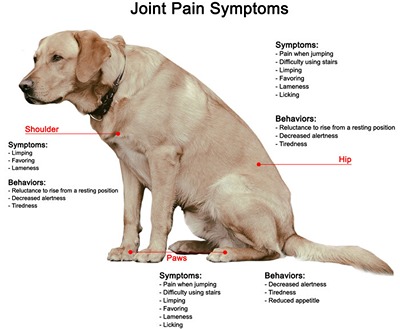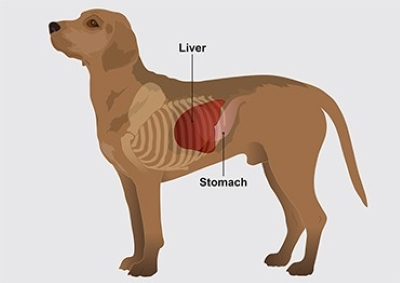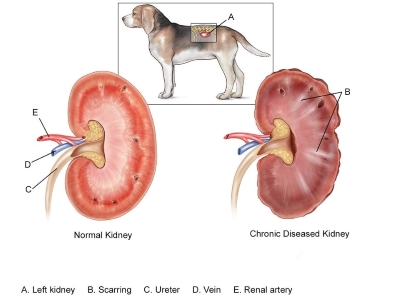As pet owners, we strive to provide the best possible care for our furry companions.
When our dogs experience pain and discomfort due to various reasons like arthritis, surgery, or injury, finding effective and safe pain relief becomes a priority.

Carprofen, a commonly prescribed medication, has gained popularity as a go-to solution for alleviating pain and inflammation in dogs.
In this article, we will delve into what carprofen is, its mechanism of action, benefits, potential risks, and considerations for its use.
Contents
What is Carprofen?
Carprofen is a Non-Steroidal Anti-Inflammatory Drug (NSAID) that is primarily used for its pain–relieving and anti–inflammatory properties.
It belongs to the propionic acid class of NSAIDs and is approved by the U.S. Food and Drug Administration (FDA) for veterinary use.

Carprofen is commonly prescribed by veterinarians to manage pain associated with osteoarthritis, post–operative pain, and various musculoskeletal conditions[1] in dogs.
According to World Health Organization (WHO), “Musculoskeletal conditions are typically characterized by pain (often persistent) and limitations in mobility and dexterity, reducing people’s ability to work and participate in society. Pain experienced in musculoskeletal structures is the most common form of non-cancer pain.”
How Does Carprofen Work?
Carprofen works by inhibiting the COX-2 enzyme, which is responsible for producing inflammatory chemicals called prostaglandins[2].
By targeting COX–2, carprofen reduces pain, inflammation, and swelling in dogs, providing relief from conditions like arthritis.

It’s a selective inhibitor, meaning it primarily affects the COX-2 enzyme while having minimal impact on COX–1, which is involved in maintaining normal bodily functions.
This mechanism helps improve a dog’s comfort and mobility while managing pain and discomfort.
Always consult a veterinarian before using carprofen or any medication for your dog.
Benefits of Carprofen for Dogs
Carprofen can help your canine feel more comfortable and improve their quality of life by lessening torment and aggravation related to different conditions.
A few of the foremost common uses of carprofen for dogs are:
Osteoarthritis
Carprofen can help manage the chronic pain and inflammation caused by osteoarthritis, a degenerative joint disease[3] that affects many older dogs.

Osteoarthritis can cause stiffness, lameness, reduced mobility, and decreased activity in your dog. Carprofen can help relieve these symptoms and slow down the progression of the disease.
Postoperative pain
Carprofen can moreover be utilized to control the torment and irritation that happens after surgery.

Whether your puppy experiences a delicate tissue surgery (such as spaying or fixing) or an orthopedic surgery (such as repairing a torn tendon or a broken bone), carprofen can offer assistance them recuperate speedier and more comfortably.
Other painful conditions
Carprofen can also be used to treat other acute or chronic painful conditions in dogs, such as trauma, back and neck injuries, dental problems, cancer, or autoimmune diseases.
Your veterinarian will determine the best course of treatment for your dog based on their diagnosis and medical history.
On PetMD, A veterinary oncologist and current president of the Veterinary Cancer Society Dr.Heather Wilson-Robles states. “Some tumors are far more likely to be deadly. Things that are localized [in a certain location] are considerably more likely to be cured. Cancers that affect the entire body have a greater fatality rate.”
Risks of Carprofen for Dogs
In spite of the fact that carprofen is for the most part secure and well-tolerated by most pooches, it can too have a few potential side impacts and dangers.
A few of the foremost common side impacts of carprofen for pooches are:
Gastrointestinal problems
In certain dogs, carprofen can induce stomach distress[4], vomiting, diarrhea, lack of appetite, and ulcers.This is because carprofen can harm the stomach and intestines‘ protective linings.

To lessen the danger of gastrointestinal issues, always provide carprofen with food and keep an eye out for any symptoms of digestive distress in your dog.
Liver problems
Carprofen can also affect the liver function in some dogs. This can cause jaundice (yellowing of the skin, eyes, or gums), increased thirst and urination, or abnormal blood tests.

To reduce the risk of liver problems, you should always follow the prescribed dosage and frequency of carprofen and have your dog’s liver enzymes checked regularly by your veterinarian.
Kidney problems
Carprofen can also affect the kidney function in some dogs. This can cause decreased urine output, increased thirst and urination, weight loss, or abnormal blood tests.

To reduce the risk of kidney problems, you should always ensure your dog has access to fresh water and have your dog’s kidney function checked regularly by your veterinarian.
Allergic reactions
In certain dogs, carprofen might induce allergic responses. This can result in hives, itching, swelling, trouble breathing, or anaphylaxis (a potentially fatal response).
If your dog has a history of allergies or sensitivities to NSAIDs or other drugs, you should always consult with your veterinarian before administering carprofen to limit the risk of adverse reactions.
Dosage of Carprofen for Dogs
The dosage of carprofen for dogs depends on their weight, condition, and response to the medication.
Your veterinarian will prescribe the appropriate dose and frequency of carprofen for your dog based on these factors.
You should never give more or less than the prescribed dose or change the frequency without consulting your veterinarian first.
The commonplace dose run of carprofen for mutts is 2 to 4 mg per kg (1 to 2 mg per lb) once or twice a day. For illustration, a 10 kg (22 lb) puppy would get 20 to 40 mg of carprofen once or twice a day.
Carprofen is available in different forms and strengths. The injectable form is given under the skin by your veterinarian in the hospital setting. The oral form can be either a tablet or a chewable that you can give at home.
The tablet form comes in 25 mg, 75 mg, and 100 mg strengths.
The chewable form comes in 25 mg, 75 mg, 100 mg, and 150 mg strengths.
You should always use the form and strength that your veterinarian prescribes for your dog.
You ought to continuously allow carprofen with nourishment to anticipate stomach disturbed.
You ought to too dodge giving carprofen with other NSAIDs (such as headache medicine, ibuprofen, or naproxen) or steroids (such as prednisone or dexamethasone) as this may increment the hazard of side impacts.
You ought to moreover advise your veterinarian of any other solutions or supplements that your puppy is taking some time recently beginning carprofen.
FAQs
What is carprofen, and how does it work for dogs?
Carprofen is a non-steroidal anti-inflammatory drug (NSAID) that helps alleviate pain and inflammation in dogs. It works by reducing the production of prostaglandins, which are responsible for promoting pain and swelling.
Is carprofen safe for my dog?
Carprofen can be safe when used under the guidance of a veterinarian and in accordance with the prescribed dosage and treatment duration. However, there are potential risks associated with its use, including gastrointestinal issues, kidney and liver concerns, and allergic reactions.
Can carprofen be given to puppies and senior dogs?
Carprofen can be prescribed for dogs of various ages, including puppies and senior dogs. However, the dosage and frequency may vary based on your dog’s age and health condition. Consult your veterinarian for proper guidance.
Can I give my dog over-the-counter pain relievers instead of carprofen?
It’s crucial to never give your dog any human over-the-counter pain relievers without consulting a veterinarian. Many human medications can be toxic to dogs and cause serious harm.
How often should my dog be monitored while on carprofen?
Regular veterinary check-ups and monitoring are essential while your dog is on carprofen. Your veterinarian may recommend blood tests to assess kidney and liver function and to ensure your dog’s overall health.
Conclusion
Carprofen can be an effective treatment for pain and inflammation in dogs, providing them with respite and an enhanced quality of life.
However, you must take this drug with cautiously, following the advice of a veterinarian and regularly monitoring your pet’s health.
Understanding the advantages, hazards, and correct application of carprofen allows you to make educated decisions that enhance your dog’s overall health and enjoyment.
Reference:
- Musculoskeletal Disorders in Dogs | Kirrawee Veterinary Hospital
- Uterine vein prostaglandin levels in late pregnant dogs | National Library of Medicine
- Osteoarthritis (Degenerative joint disease) | MSD Veterinary Manual
- Digestive issues in dogs: Causes, prevention, and treatment | Bond Vet

Dania is a dog groomer living in California, who loves styling dogs. She often uses dog accessories to keep them distracted while grooming. She is also a dog parent to a Pomeranian, Duke. It’s because of him she is always on a lookout for the best dog foods, toys, other dog accessories, and ways to keep him equipped, healthy and happy.

